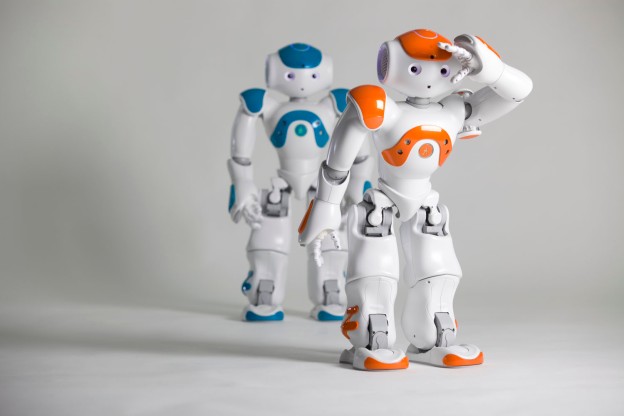[Original post: http://intjforum.com/showpost.php?p=5159026&postcount=2%5D
Video:
My thoughts (I’m ‘S’)—
Video: King’s Wise Men/NAO demonstration
S: Impressive. I’d be interested to see what future directions the involved researchers take things.
Prof. Bringsjord: “By passing many tests of this kind—however narrow—robots will build up and collect a repertoire of abilities that start to become useful when put together.”
S: Didn’t touch on how said abilities could be “added up” into a potential singular (human-like) robot. Though Bringsjord doesn’t explicitly seem to be committing to such, the video’s narrator himself claims to see it as “much like a child learning individual lessons about its actual existence”, and then “putting what it learns all together”; which is the same sort of reductionist optimism that drove and characterized artificial intelligence’s first few decades of work (before the field realized its understandings of mind and humanness were sorely needing). So the narrator lverbally) endorses the view that adding up robotic abilities is possible within a single unit, which I have yet to see proof or sufficient reason to be confident of.
(Being light, for a moment: Bringsjord could well have a capitalistic, division-of-labor sort of robotic-societal scenario ready-at-mind in espousing statements like this…)
Narrator: “The robot talked about in this video is not the first robot to seem to display a sense of self.”
S: ‘Self’ is a much trickier and more abstract notion to handle, especially in this context. No one in the video defines it, or tries to say whether or how it’s related to sentience or consciousness (defined in the two ways the narrator points to), and few philosophers and psychologists have done a good job with it as of yet, either. See Stan Klein’s work for the best modern treatment of self that I’ve yet come across.
Video: Guy with the synthetic brain
S: Huh…alright–neat, provided that’s actually real. Sort of creepy (uncanny valley, anyone?), but at least he can talk Descartes…not that I know why anyone would usefully care to do so, mind, at this specific point of time in cognitive science’s trajectory.
Dr. Hart: “The idea requires that there is something beyond the physical mechanisms of thought that experiences the sunrise, which robots would lack.”
S: Well, yeah: the “physical mechanisms of thought” don’t equal the whole, sum-total experiencer. Also, I’m not sure what he means by something being “beyond” the physical mechanisms of thought…sort of hits my ears as naive dualism, though that might only be me tripping on semantics.
Prof. Hart (?): “The ability of any entity to have subjective perceptual experiences…is distinct from other aspects of the mind, such as consciousness, creativity, intelligence, or self-awareness.”
S: Not much a fan of treating creativity and intelligence as “aspects of the mind”…same goes for consciousness, for hopefully more-obvious reasons. Maurice Merleau-Ponty is the one to look into with respect to “subjective perceptual experiences”, specifically his Phenomenology of Perception.
Narrator: “No artificial object has sentience.”
Well, naturally it’s hard to say w/r/t their status of having/not having “subjective perceptual experience”, but feelings are currently being worked on in the subfield of affective computing. (There’s still much work re. emotion to be done in psychology and the harder sciences before said subfield can *really* be considered in the context of robotic sentience, though.)
Narrator: “Sentience is the only aspect of consciousness that cannot be explained…many [scientists] go as far as to say it will never be explained by science.”
S: They may think so, and perhaps for good philosophical reasons; but that won’t stop, and indeed isn’t stopping some researchers from trying.
Narrator: “Before this [NAO robot speaking in the King’s Wise Men], nobody knew if robbots could ever be aware of themselves; and this experiment proves that they can be.”
Aware of themselves again leads to the problem briefly alluded to above, regarding the philosophical and scientific impoverishment of the notion of ‘self’. I know what the narrator is attempting to get at, but I still believe this point deserves pushing.
Narrator: “The question should be, ‘Are we nearing robotic phenomenological consciousness?’”
S: Yep! And indeed, you have people like Hubert Dreyfus arguing for “Heideggerian AI” as a remedy for AI’s current inability to exhibit “everyday coping”, i.e. operating with general intelligence and situational adaptability in the world (or “being-in-the-world”, a la Heidegger).
In cognitive science terms, this basically boils down to the main idea underlying embodied cognition, a big move away from the old Cartesian or “representational” view of mind.
Narrator: “When you take away the social constructs, categories, and classes that we all define ourselves and each other by, and just purely looking at what we are as humans and how incredibly complex we are as beings, and how remarkably well we function in a way, actually really amazing, and kind of beautiful, too…so smile, because being human means that you’re an incredible piece of work.”
S: I wish the narrator would have foregone the cheesy-but-necessary-for-his-documenting-purposes part about humans’ beauty and complexity, in favor of going a bit further into the obviously difficult and tricky territory of “social constructs, categories, and classes” that we “all define ourselves and each other by”: and how near or far robots can be said to be from having truly human-like socio-cultural sensibilities and competencies.


did they remove the dumbing restriction on the three robots and then ask them which ones were unable to talk? i’m not sure i agree that this demonstrates self-awareness, to some extent self-awareness to me implies independence and the ability to respond to environmental stimulus as well as the ability not to respond by choice. seems to me that this robot was just following an algorithm. it understands the concept of a dumbing pill and what that means, and when it tries to talk and hears itself, that tells it that there was no dumbing pill. kind of weak.
LikeLike